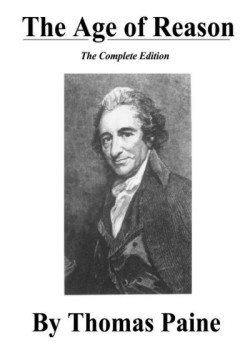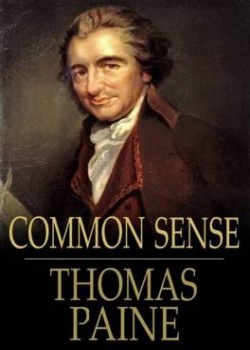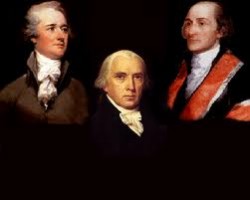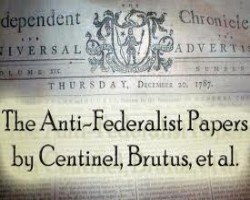CONSTITUTION OF THE UNITED STATES
CHAPTER XXII
POWER OVER THE MILITIA
§ 1203. The next power of congress is:
"To provide for calling forth the militia to execute the laws of the Union, suppress insurrections, and repel invasions."
§ 1204. This clause seems, after a slight amendment, to have passed the convention without opposition. It cured a defect severely felt under the confederation, which contained no provision on the subject.
§ 1205. The power of regulating the militia, and of commanding its services to enforce the laws, and to suppress insurrections, and repel invasions, is a natural incident to the duty of superintending the common defence, and preserving the internal peace of the nation. In short, every argument, which is urged, or can be urged against standing armies in time of peace, applies forcibly to the propriety of vesting this power in the national government. There is but one of two alternatives, which can be resorted to in cases of insurrection, invasion, or violent opposition to the laws; either to employ regular troops, or to employ the militia to suppress them. In ordinary cases, indeed, the resistance to the laws may be put down by the posse comitatus, or the assistance of the common magistracy. But cases may occur, in which such a resort would be utterly vain, and even mischievous; since it might encourage the factious to more rash measures, and prevent the application of a force, which would at once destroy the hopes, and crush the efforts of the disaffected. The general power of the government to pass all laws necessary and proper to execute its declared powers, would doubtless authorize laws to call forth the posse comitatus, and employ the common magistracy, in cases, where such measures would suit the emergency. But if the militia could not be called in aid, it would be absolutely indispensable to the common safety to keep up a strong regular force in time of peace. The latter would certainly not be desirable, or economical; and therefore this power over the militia is highly salutary to the public repose, and at the same time an additional security to the public liberty. In times of insurrection or invasion, it would be natural and proper, that the militia of a neighbouring state should be marched into another to resist a common enemy, or guard the republic against the violence of a domestic faction or sedition. But it is scarcely possible, that in the exercise of the power the militia should ever be called to march great distances, since it would be at once the most expensive and the most inconvenient force, which the government could employ for distant expeditions. The regulation of the whole subject is always to be in the power of congress; and it may from time to time be moulded so, as to escape from all dangerous abuses.
§ 1206. Notwithstanding the reasonableness of these suggestions, the power was made the subject of the most warm appeals to the people, to alarm their fears, and surprise their judgment. At one time it was said, that the militia under the command of the national government might be dangerous to the public liberty; at another, that they might be ordered to the most distant places, and burthened with the most oppressive services; and at another, that the states might thus be robbed of their immediate means of defence. How these things could be accomplished with the consent of both houses of congress, in which the states and the people of the states are represented, it is difficult to conceive. But the highly coloured and impassioned addresses, used on this occasion, produced some propositions of amendment in the state conventions, which, however, were never duly ratified, and have long since ceased to be felt, as matters of general concern.
§ 1207. The next power of congress is, "to provide for organizing, arming, and disciplining the militia, and for governing such part of them, as may be employed in the service of the United States; reserving to the states respectively the appointment of the officers, and the authority of training the militia according to the discipline prescribed by congress."
§ 1208. This power has a natural connexion with the preceding, and, if not indispensable to its exercise, furnishes the only adequate means of giving it promptitude and efficiency in its operations. It requires no skill in the science of war to discern, that uniformity in the organization and discipline of the militia will be attended with the most beneficial effects, whenever they are called into active service. It will enable them to discharge the duties of the camp and field with mutual intelligence and concert, an advantage of peculiar moment in the operations of an army; and it will enable them to acquire, in a much shorter period, that degree of proficiency in military functions, which is essential to their usefulness. Such an uniformity, it is evident, can be attained only through the superintending power of the national government.
§ 1209. This clause was nor in the original draft of the constitution; but it was subsequently referred to a committee, who reported in favour of the power; and after considerable discussion it was adopted in its present shape by a decided majority. The first clause in regard to organizing, arming, disciplining, and governing the militia, was passed by a vote of nine states against two; the next, referring the appointment of officers to the states, after an ineffectual effort to amend it by confining the appointment to officers under the rank of general officers, was passed without a division; and the last, referring the authority to train the militia according to the discipline prescribed by congress, was passed by a vote of seven states against four.
§ 1210. It was conceived by the friends of the constitution, that the power thus given, with the guards, reserving the appointment of the officers, and the training of the militia to the states, made it not only wholly unexceptionable, but in reality an additional security to the public liberties. It was nevertheless made a topic of serious alarm and powerful objection. It was suggested, that it was indispensable to the states, that they should possess the control and discipline of the militia. Congress might, under pretence of organizing and disciplining them, inflict severe and ignominious punishments on them. The power might be construed to be exclusive in congress. Suppose, then, that congress should refuse to provide lot arming or organizing them, the result would be, that the states would be utterly without the means of defence, and prostrate at the feet of the national government. It might also be said, that congress possessed the exclusive power to suppress insurrections, and repel invasions, which would take from the states all effective means of resistance. The militia might be put under martial law, when not under duty in the public service.
§ 1211. It is difficult fully to comprehend the influence of such objections, urged with much apparent sincerity and earnestness at such an eventful period. The answers then given seem to have been in their structure and reasoning satisfactory and conclusive. But the amendments proposed to the constitution (some of which have been since adopted) show, that the objections were extensively felt, and sedulously cherished. The power of congress over the militia (it was urged) was limited, and concurrent with that of the states. The right of governing them was confined to the single case of their being in the actual service of the United States, in some of the cases pointed out in the constitution. It was then, and then only, that they could be subjected by the general government to martial law. If congress did not choose to arm, organize, or discipline the militia, there would be an inherent fight in the states to do it. All, that the constitution intended, was, to give a power to congress to ensure uniformity, and thereby efficiency. But, if congress refused, or neglected to perform the duty, the states had a perfect concurrent right, and might act upon it to the utmost extent of sovereignty. As little pretence was there to say, that congress possessed the exclusive power to suppress insurrections and repel invasions. Their power was merely competent to reach these objects; but did not, and could not, in regard to the militia, supersede the ordinary rights of the states. It was, indeed, made a duty of congress to provide for such cases; but this did not exclude the co-operation of the states. The idea of congress inflicting severe and ignominious punishments upon the militia in times of peace was absurd. It presupposed, that the representatives had an interest, and would intentionally take measures to oppress them, and alienate their affections. The appointment of the officers of the militia was exclusively in the states; and how could it be presumed, that such men would ever consent to the destruction of the rights or privileges of their fellow-citizens. The power to discipline and train the militia, except when in the actual service of the United States, was also exclusively vested in the states; and under such circumstances, it was secure against any serious abuses.1 It was added, that any project of disciplining the whole militia of the United States would be so utterly impracticable and mischievous, that it would probably never be attempted. The most, that could be done, would be to organize and discipline select corps; and these for all general purposes, either of the states, or of the Union, would be found to combine all, that was useful or desirable in militia services.
§ 1212. It is hardly necessary to say, how utterly without any practical justification have been the alarms, so industriously spread upon this subject at the time, when the constitution was put upon its trial.2 Upon two occasions only has it been found necessary on the part of the general government, to require the aid of the militia of the states, for the purpose of executing the laws of the Union, suppressing insurrections, or repelling invasions. The first was to suppress. the insurrection in Pennsylvania in 1794;3 and the other, to repel the enemy in the recent war with Great Britain. On other occasions, the militia has indeed been called into service to repel the incursions of the Indians; but in all such cases, the injured states have led the way, and requested the co-operation of the national government. In regard to the other power of organizing, arming, and disciplining the militia, congress passed an act in 1792,4 more effectually to provide for the national defence, by establishing a uniform militia throughout the United States. The system provided by this act, with the exception of that portion, which established the rules of discipline and field service, has ever since remained in force. And the militia are now governed by the same general system of discipline and field exercise, which is observed by the regular army of the United States.1 No jealousy of military power, and no dread or severe punishments are now indulged. And the whole militia system has been as mild in its operation, as it has been satisfactory to the nation.
§ 1213. Several questions of great practical importance have arisen under the clauses of the constitution respecting the power over the militia, which deserve mention in this place. It is observable, that power is given to congress "to provide for calling forth the militia to execute the laws of the Union, suppress insurrections, and repel invasions." Accordingly, congress in 1795, in pursuance of this authority, and to give it a practical operation, provided by law, "that whenever the United States shall be invaded, or be in imminent danger of invasion from any foreign nation or Indian tribe, it shall be lawful for the president to call forth such number of the militia of the state, or states most convenient to the place of danger, or scene of action, as he may judge necessary, to repel such invasion, and to issue his order for that purpose to such officer or officers of the militia, as he shall think proper." Like provisions are made for the other cases stated in the constitution. The constitutionality of this act has not been questioned, although it provides for calling forth the militia, not only in cases of invasion, but of imminent danger of invasion; for the power to repel invasions must include the power to provide against any attempt and danger of invasion, as the necessary and proper means to effectuate the object. One of the best means to repel invasion is, to provide the requisite force for action, before the invader has reached the territory of the nation. Nor can there be a doubt, that the president, who is (as will be presently seen) by the constitution the commander-in-chief of the army and navy of the United States, and of the militia, when called into the actual service of the United States, is the proper functionary, to whom this high and delicate trust ought to be confided. A free people will naturally be jealous of the exercise of military power; and that of calling forth the militia is certainly one of no ordinary magnitude. 'It is, however, a power limited in its nature to certain exigencies; and by whomsoever it is to be executed, it carries with it a corresponding responsibility. Who is so fit to exercise the power, and to incur the responsibility, as the president?
§ 1214. But a most material question arises: By whom is the exigency (the casts faederis, if one may so say) to be decided? Is the president the sole and exclusive judge, whether the exigency has arisen, or is it to be considered, as an open question, which every officer, to whom the orders of the president are addressed, may decide for himself, and equally open to be contested by every militia-man, who shall refuse to obey the orders of the president? This question was much agitated during the late war with Great Britain, although it is well known, that it had been practically settled by the government, in the year 1794, to belong exclusively to the president; and no inconsiderable diversity of opinion was then manifested in the heat of the controversy, pendente lite, et flagrante hello. In Connecticut and Massachusetts, it was held, that the governors of the states, to whom orders were addressed by the president to call forth the militia on account of danger of invasion, were entitled to judge for themselves, whether the exigency had arisen; and were .not bound by the opinion or orders of the president? This doctrine, however, was disapproved elsewhere. It was contested by the government of the United States; and was renounced by other states.
§ 1215. At a very recent period, the question came before the Supreme Court of the United States for a judicial decision; and it was then unanimously determined, that the authority to decide, whether the exigency has arisen, belongs exclusively to the president; and that his decision is conclusive upon all other persons. The court said, that this construction necessarily resulted from the nature of the power itself, and from the manifest objects contemplated by the act of congress. The power itself is to be exercised upon sudden emergencies, upon great occasions of state, and under circumstances, which may be vital to the existence of the Union. A prompt and unhesitating obedience to orders is indispensable to the complete attainment of the object. The service is a military service, and the command of a military nature; and in such cases, every delay and every obstacle to an efficient and immediate compliance would necessarily tend to jeopard the public interests. While subordinate officers or soldiers are pausing to consider, whether they ought to obey, or are scrupulously weighing the facts, upon which the commander-in-chief exercises the fight to demand their services, the hostile enterprize may be accomplished, without the means of resistance. If the power of regulating the militia, and of commanding its services in times of insurrection and invasion, are, as it has been emphatically said, they are,1 natural incidents to the duties of superintending the common defence, and of watching over the internal peace of the confederacy, these powers must be so construed, as to the modes of their exercise, as not to defeat the great end in view. If a superior officer has a right to contest the orders of the president, upon his own doubts, as to the exigency having arisen, it must be equally the right of every inferior officer and soldier. And any act done by any person in furtherance of such orders would subject him to responsibility in a civil suit, in which his defence must finally rest upon his ability to establish the facts by competent proofs. Besides; in many instances the evidence, upon which the president might decide, that there was imminent danger of invasion, might be of a nature not constituting strict technical proof; or the disclosure of the evidence might reveal important state secrets, which the public interest, and even safety, might imperiously demand to be kept in concealment. The act of 1795 was manifestly framed upon this reasoning. The president is by it necessarily constituted, in the first instance, the judge of the existence of the exigency, and is hound to act according to his belief of the facts. If he does so act, and decides to call out the militia, his orders for this purpose are in strict conformity to the law; and it would seem to follow, as a necessary consequence, that every act done by a subordinate officer in obedience to such orders is equally justifiable. The law contemplates, that under such circumstances orders shall be given to carry the power into effect; and it cannot be, that it is a correct inference, that any other person has a right to disobey them. No provision is made for an appeal from, or review of the president's opinion. And whenever a statute gives a discretionary power to any person to be exercised by him upon his own opinion of certain facts, the general rule of construction is, that he is thereby constituted the sole and exclusive judge of the existence of those facts.
§ 1216. It seems to be admitted, that the power to call forth the militia may be exercised either by requisitions upon the executive of the states; or by orders directed to such executive, or to any subordinate officers of the militia. It is not, however, to be understood, that the state executive is in any case bound to leave his executive duties, and go personally into the actual service of the United States.
§ 1217. The power to govern the militia, when in the actual service of the United States, is denied by no one to be an exclusive one. Indeed, from its very nature, it must be so construed; for the notion of distinct and independent orders from authorities wholly unconnected, would be utterly inconsistent with that unity of command and action, on which the success of all military, operations must essentially depend.2 But there is nothing in the constitution, which prohibits a state from calling forth its own militia, not detached into the service of the Union, to aid the United States in executing the laws, in suppressing insurrections, and in repelling invasions. Such a concurrent exercise of power in no degree interferes with, or obstructs the exercise of the powers of the Union. Congress may, by suitable laws, provide for the calling forth of the militia, and annex suitable penalties to disobedience of their orders, and direct the manner, in which the delinquents may be tried. But the authority to call forth, and the authority exclusively to govern, are quite distinct in their nature. The question, when the authority of congress over the militia becomes exclusive, must essentially depend upon the fact, when they are to be deemed in the actual service of the United States. There is a clear distinction between calling forth the militia, and their being in actual service. These are not contemporaneous acts, nor necessarily identical in their constitutional bearings. The president is not commander-in-chief of the militia, except when in actual service; and not, when they are merely ordered into service. They are subjected to martial law only, when in actual service, and not merely when called forth, before they have obeyed the call. The act of 1795, and other acts on this subject, manifestly contemplate and recognise this distinction. To bring the militia within the meaning of being in actual service, there must be an obedience to the call, and some acts of organization, mustering, rendezvous, or marching, done in obedience to the call, in the public service.
§ 1218. But whether the power is exclusive in congress to punish delinquencies in not obeying the call on the militia, by their own courts-martial, has been a question much discussed, and upon which no inconsiderable contrariety of opinion has been expressed. That it may, by law, be made exclusive, is not denied. But if no such law be made, whether a state may not, by its own laws, constitute courts-martial to try and punish the delinquencies, and inflict the penalties prescribed by the act of congress, has been the point of controversy. It is now settled, that, under such circumstances, a state court-martial may constitutionally take cognizance of, and inflict the punishment. But a state cannot add to, or vary the punishments inflicted by the acts of congress upon the delinquents.
§ 1219. A question of another sort was also made during the late war with Great Britain; whether the militia, called into the actual service of the United States, were to be governed and commanded by any officer, but of the same militia, except the president of the United States; in other words, whether the president could delegate any other officer of the regular army, of equal or superior rank, to command the militia in his absence. It was held in several of the Eastern states, that the militia were exclusively under the command of their own officers, subject to the personal orders of the president; and that he could not authorize any officer of the army of the United States to command them in his absence, nor place them under the command of any such officer. This doctrine was deemed inadmissible by the functionaries of the United States. It has never yet been settled by any definitive judgment of any tribunal competent to decide it. If, however, the doctrine can be maintained, it is obvious, that the public service must be continually liable to very great embarrassments in all eases, where the militia are called into the public service in connexion with the regular troops.







The most important project on this website is "THE WORKS."
This is the place where you can read the words of the founding fathers and those who had a VERY BIG part in the founding of this country.
Not only do we have the Federalist and the Anti-Federalist Papers, but we also have other Constitutional Commentaries that were written shortly after the Constitution was ratified.